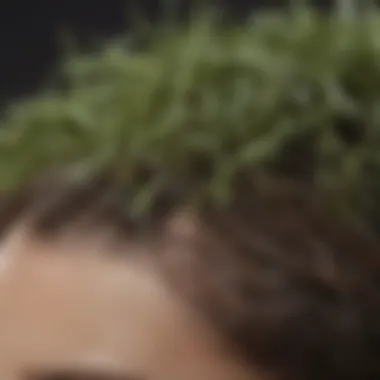Unlocking the Secrets: How to Naturally Regrow Your Hair with Ease


Insider Beauty Tips
In the realm of regrowing hair naturally, insider beauty tips play a pivotal role in achieving optimal results. These tips encompass a broad spectrum of insights, ranging from simple lifestyle changes to intricate hair care routines. Beauty enthusiasts seeking to revitalize their locks can benefit significantly from expert advice on harnessing the power of natural remedies and methods.
Skincare Tips
When it comes to regrowing hair, the significance of skincare tips should not be underestimated. The scalp's health is crucial for promoting hair growth, making skincare routines a critical aspect of the regrowth process. From gentle exfoliation to nourishing treatments, understanding how to care for your scalp can foster an environment that is conducive to healthy hair regrowth.
Haircare Secrets
Unlocking the secrets to effective hair care is essential in the journey to regrow hair naturally. From selecting the right products to establishing a personalized hair care regimen, these secrets delve into the nuances of nurturing your hair back to its former glory. By incorporating these strategies into your daily routine, you can pave the way for strong, lustrous locks that exude vitality and health.
Understanding Hair Loss
Hair loss is a common concern for many individuals, impacting self-esteem and overall well-being. In this article, we delve into the intricacies of understanding hair loss. By exploring the causes, types, and impacts of hair loss, we equip you with the knowledge to address this issue effectively. Understanding the root factors behind hair loss is crucial for implementing targeted solutions and fostering hair regrowth.
Causes of Hair Loss
Hair loss can stem from various factors, ranging from genetics to lifestyle choices. Understanding these causes is key to formulating a personalized approach to combatting hair loss.
Genetics
Genetics plays a significant role in hair loss, shaping the susceptibility of individuals to conditions such as androgenetic alopecia. By examining familial patterns and inherited traits, we can better comprehend the genetic component of hair loss. While genetics may predispose individuals to hair loss, awareness of this factor empowers proactive measures to mitigate its effects.
Hormonal Imbalance
Hormonal fluctuations can disrupt the hair growth cycle, leading to excessive shedding or thinning. By addressing hormonal imbalances through dietary modifications or medical interventions, individuals can restore hair health and promote regrowth.
Stress
Chronic stress is a prominent contributor to hair loss, triggering conditions like telogen effluvium. Managing stress through relaxation techniques and lifestyle adjustments is paramount for maintaining a healthy scalp environment and fostering hair rejuvenation.
Medical Conditions
Underlying medical conditions, such as thyroid disorders or autoimmune diseases, can manifest in hair loss. Seeking professional guidance to diagnose and treat these conditions is essential for halting further hair thinning and encouraging regrowth.
Types of Hair Loss
Hair loss manifests in various forms, each with distinct characteristics and treatment considerations. By recognizing these types, individuals can tailor their hair care routines to address specific needs and promote optimal hair growth.
Androgenetic Alopecia
Androgenetic alopecia, commonly known as male or female pattern baldness, is influenced by genetic factors and hormonal imbalances. Understanding the progressive nature of this condition is vital for implementing early interventions to preserve hair density and minimize thinning.
Telogen Effluvium
Telogen effluvium results from stress, illness, or hormonal shifts, causing excessive shedding and temporary hair loss. Identifying and addressing the underlying triggers of telogen effluvium is crucial for restoring hair volume and vitality.


Alopecia Areata
Alopecia areata is an autoimmune condition characterized by patchy hair loss. Exploring the mechanisms of this condition and seeking targeted treatments can facilitate hair regrowth and prevent further hair thinning.
Impact of Diet and Lifestyle
The role of diet and lifestyle in hair health cannot be overstated. Nutritional deficiencies, inadequate stress management, and sedentary habits can impede hair growth and undermine scalp health. By adopting prudent dietary choices and active lifestyle practices, individuals can optimize their hair regrowth potential.
Nutritional Deficiencies
Nutrients like biotin, vitamin D, and iron are essential for promoting hair strength and vitality. Recognizing and addressing nutritional deficiencies through dietary modifications or supplements can rejuvenate hair follicles and enhance overall hair quality.
Stress Management
Effective stress management is pivotal for preventing stress-induced hair loss and preserving hair density. Incorporating stress-relief techniques like mindfulness, meditation, or yoga into daily routines can create a conducive environment for hair regeneration.
Exercise Routine
Regular physical activity stimulates blood circulation to the scalp, promoting nutrient delivery and oxygenation to hair follicles. Developing an exercise regimen tailored to individual needs can optimize hair growth and bolster scalp health.
Natural Remedies for Hair Growth
In the realm of hair care and revitalization, natural remedies play a vital role in promoting healthy hair growth. Incorporating natural elements into one's hair care routine can significantly impact the quality and quantity of hair. Natural remedies offer a gentle yet effective approach to nourishing the scalp and hair follicles, aiding in regrowth and rejuvenation. From scalp massages to the use of essential oils and nutritional supplements, embracing natural remedies can be a game-changer in the journey to regrow hair naturally.
Scalp Massage Techniques
As an essential component of natural hair care, scalp massage techniques have garnered attention for their ability to stimulate blood flow to the scalp. This increased circulation nourishes the hair follicles, promoting better growth and thickness. By incorporating scalp massages into your routine, you can enjoy not just the physical benefits but also the mental relaxation they provide. Scalp massages not only contribute to hair growth but also offer a moment of self-care and rejuvenation in our fast-paced lives.
Benefits of Scalp Massage
Delving into the benefits of scalp massage reveals a myriad of advantages. Enhanced blood circulation not only nourishes hair follicles but also improves the overall health of the scalp. Reduced stress and tension in the scalp region can alleviate headaches and promote relaxation. Additionally, regular scalp massages can help distribute natural oils, keeping the hair healthy and lustrous. The gentle yet effective nature of scalp massages makes them a popular choice for individuals looking to improve their hair health naturally.
Best Oils for Scalp Massage
When it comes to choosing the right oils for scalp massage, certain options stand out for their unique properties. Oils like jojoba, coconut, and almond oil are known for their moisturizing and nourishing qualities, benefiting both the scalp and hair strands. Incorporating essential oils such as peppermint, lavender, and rosemary can further amplify the benefits of scalp massages. Each oil brings its own set of advantages, from soothing properties to promoting hair strength and growth. Selecting the best oil for your scalp massage can enhance the overall experience and effectiveness of this practice.
Essential Oils for Hair Regrowth
Essential oils have long been praised for their therapeutic properties, especially in the realm of hair care. Among the essential oils known for promoting hair regrowth, rosemary oil stands out for its stimulating effect on hair follicles. By enhancing circulation and follicle strength, rosemary oil can aid in combating hair loss and encouraging new growth. Similarly, lavender oil offers a calming and balancing effect, making it ideal for individuals dealing with stress-related hair issues. Peppermint oil, with its cooling and invigorating properties, can help stimulate the scalp and promote hair growth.
Rosemary Oil
The inclusion of rosemary oil in hair care routines can benefit individuals seeking to improve hair thickness and strength. Its antibacterial properties help maintain a healthy scalp environment, reducing the risk of dandruff and infections. By stimulating circulation, rosemary oil can boost hair growth and rejuvenate dormant follicles. Regular use of rosemary oil not only nourishes the scalp but also adds shine and vitality to the hair, making it a popular choice for those aiming to regrow their hair naturally.
Lavender Oil
With its soothing aroma and calming properties, lavender oil is a versatile addition to any hair care regimen. Beyond its relaxing scent, lavender oil possesses antifungal and antibacterial qualities that promote scalp health. By reducing inflammation and improving blood circulation, lavender oil supports hair growth and strengthens hair follicles. Its gentle nature makes it suitable for all hair types, making it a go-to option for individuals looking to enhance their hair regrowth journey.
Peppermint Oil


Renowned for its refreshing scent and invigorating properties, peppermint oil is a powerhouse in the realm of hair care. Its menthol component provides a cooling sensation that can help soothe the scalp and reduce itchiness. By increasing circulation and promoting hair follicle health, peppermint oil can contribute to improved hair growth and thickness. The revitalizing effects of peppermint oil make it a popular choice for those seeking to revitalize their hair naturally.
Nutritional Supplements for Hair Health
Nutritional supplements play a crucial role in supporting overall hair health and promoting growth. Among the key supplements known to benefit hair health, biotin stands out for its role in promoting hair growth and strengthening hair strands. Vitamin D, essential for various bodily functions, also contributes to hair health by supporting follicle function and hair growth. Iron deficiency has been linked to hair loss, making it essential to include iron-rich foods or supplements in your diet to maintain healthy hair growth.
Biotin
As a vital component in the B-vitamin complex, biotin plays a crucial role in supporting the health of hair, skin, and nails. Known for its ability to strengthen hair strands and promote growth, biotin is a popular choice for individuals looking to improve their hair health naturally. By aiding in the production of keratin, a protein essential for hair structure, biotin can enhance the strength and resilience of hair strands. Additionally, biotin supports the overall health of the scalp, contributing to a conducive environment for hair growth.
Vitamin
Beyond its role in bone health, vitamin D plays a significant part in maintaining healthy hair follicles and promoting hair growth. Adequate vitamin D levels are crucial for the cycling of hair growth, ensuring that follicles function optimally. By addressing potential deficiencies and incorporating vitamin D-rich foods or supplements into your diet, you can support the growth and strength of your hair naturally. The role of vitamin D in hair health highlights the importance of a well-rounded approach to caring for your hair.
Iron
Iron deficiency is a common cause of hair loss, making it imperative to ensure adequate iron levels for healthy hair growth. Iron is essential for the production of hemoglobin, which carries oxygen to the body's tissues, including the hair follicles. By incorporating iron-rich foods or supplements into your diet, you can support the oxygenation of hair follicles, promoting healthy growth and preventing undue shedding. Including iron in your nutritional supplements for hair health can have a significant impact on the vitality and fullness of your hair.
Hair Care Practices
Hair care practices play a pivotal role in the journey to regrowing hair naturally. By adhering to a meticulous hair care routine, individuals can nurture their scalp and hair, fostering an environment conducive to healthy hair growth. The significance of implementing proper hair care practices cannot be overstated, as it directly impacts the overall health and vitality of one's hair strands.
Gentle Hair Care Routine
Embarking on a gentle hair care routine sets the foundation for robust hair growth. This includes incorporating sulfate-free shampoos into your regimen, which are formulated to cleanse the hair gently without stripping it of natural oils. Sulfate-free shampoos are renowned for their mild yet effective cleansing properties, making them an ideal choice for individuals seeking to promote hair growth while maintaining scalp health.
Sulfate-Free Shampoos
Sulfate-free shampoos boast the key characteristic of being devoid of harsh sulfates, which can strip the hair of its natural oils and moisture. This gentle formulation not only cleanses the hair effectively but also minimizes the risk of scalp irritation and dryness. Opting for sulfate-free shampoos in your hair care routine can help preserve the natural oils on your scalp, promoting a healthier environment for hair follicle growth.
Avoiding Heat Damage
Mitigating heat damage is crucial in preserving the strength and integrity of your hair strands. Excessive heat styling tools can lead to hair breakage and dryness, impeding the regrowth process. By steering clear of intense heat exposure and utilizing heat protectants when styling, individuals can safeguard their hair from unnecessary damage and foster optimal conditions for regrowth.
Proper Detangling Methods
Effective detangling methods are pivotal in preventing hair breakage and preserving hair health. Utilizing proper detangling tools and techniques, such as wide-tooth combs or detangling brushes, minimizes tension on the hair shaft and reduces the risk of breakage. Gentle detangling practices are essential in maintaining the strength and condition of your hair, supporting its resilience and promoting healthy regrowth.
Hair Masks and Treatments
Integrating nourishing hair masks and treatments into your hair care routine offers a rejuvenating boost to your hair strands, enhancing their strength and vitality. Whether opting for DIY hair masks or professional treatments, these nourishing formulations work to replenish moisture, repair damage, and fortify the hair structure, paving the way for enhanced regrowth.
DIY Hair Masks
DIY hair masks provide a customizable approach to addressing specific hair concerns, such as dryness, breakage, or dullness. By utilizing natural ingredients like avocado, honey, and coconut oil, individuals can create potent formulations tailored to their hair needs. DIY hair masks offer a cost-effective and organic way to pamper your hair, infusing it with nourishment and promoting overall hair health.
Professional Treatments
Professional hair treatments offer targeted solutions for individuals dealing with complex hair issues or seeking intensive care. From keratin treatments to scalp exfoliation therapies, professional hair treatments are designed to deliver impactful results, addressing a myriad of hair concerns with precision and expertise. Consulting with seasoned hair specialists for professional treatments can elevate your hair care regimen, accelerating the regrowth process and revitalizing your hair from within.


Consulting a Professional
In navigating the complex world of hair regrowth, seeking advice and guidance from hair care professionals is paramount. Consulting a dermatologist or trichologist can provide targeted solutions to address underlying issues causing hair loss. These specialists are equipped with the knowledge and expertise to recommend tailored treatments based on individual needs and conditions, ensuring effective results. Their in-depth understanding of scalp health and hair follicle dynamics enables them to offer personalized advice, making the journey to regaining hair a well-informed one.
Dermatologist Advice
Medical Treatments
When exploring options for combating hair loss, medical treatments stand out as a significant intervention. These treatments encompass a range of medications and procedures designed to stimulate hair growth, combatting conditions such as androgenetic alopecia effectively. The key characteristic of medical treatments lies in their ability to target specific hair loss causes, promoting regrowth from a physiological standpoint. While medical treatments may present side effects or contraindications, their role in addressing hair loss makes them a popular choice for individuals seeking clinically proven solutions.
PRP Therapy
PRP (Platelet-Rich Plasma) therapy offers a cutting-edge approach to hair restoration by harnessing the rejuvenating properties of one's blood platelets. This innovative technique involves extracting platelet-rich plasma from the patient's blood and reinjecting it into the scalp, stimulating hair follicles' growth and increasing hair density. The unique feature of PRP therapy lies in its ability to accelerate tissue repair and promote cell regeneration, contributing to improved hair health. While PRP therapy may entail multiple sessions and a higher cost compared to conventional treatments, its role in enhancing hair regrowth makes it a valuable option for individuals seeking advanced solutions.
Hair Transplant Options
Hair transplant procedures have revolutionized the field of hair restoration, offering a permanent solution to hair loss. By transplanting healthy hair follicles from donor areas to balding or thinning regions, this technique restores natural-looking hair growth. The key characteristic of hair transplant options is their long-term effectiveness, providing lasting results that mimic native hair patterns. Despite being a surgical procedure with associated risks and downtime, the benefits of natural-looking hair regeneration make hair transplant options a desirable choice for individuals looking for definitive outcomes.
Trichologist Consultation
Hair Analysis
A detailed hair analysis conducted by a trichologist plays a crucial role in diagnosing the root causes of hair loss. Through advanced diagnostic tools and techniques, trichologists can assess scalp health, follicle vitality, and potential deficiencies affecting hair growth. The key characteristic of hair analysis is its precision in identifying specific issues, leading to customized treatment recommendations tailored to individual requirements. While hair analysis may require time for accurate results and interpretation, its importance in unraveling the complexities of hair loss underscores its significance in comprehensive regrowth strategies.
Customized Treatment Plans
Trichologists develop bespoke treatment plans based on the findings of hair analysis, addressing underlying issues contributing to hair loss. These personalized plans encompass a holistic approach that may include dietary adjustments, topical solutions, and targeted therapies to promote hair health. The unique feature of customized treatment plans lies in their personalized nature, catering to the individual's unique hair characteristics and needs. While implementing customized treatment plans may require consistency and patience to observe results, their tailored approach enhances the likelihood of successful hair regrowth outcomes.
Lifestyle Changes for Hair Regrowth
Lifestyle changes play a pivotal role in the quest for hair regrowth. The interconnectedness of our overall well-being with the health of our hair cannot be overstated. Embracing a holistic approach by making specific lifestyle modifications can significantly impact the vitality and strength of our hair. From stress reduction techniques to adopting healthy dietary habits, every aspect of our lifestyle can influence the condition of our hair. By prioritizing these changes, individuals can enhance their hair regrowth journey.
Stress Reduction Techniques
Stress reduction techniques are paramount in promoting hair regrowth. By effectively managing stress levels, individuals create an environment conducive to healthy hair growth. Among the myriad options available, two popular techniques stand out for their efficacy: yoga and meditation, and breathing exercises.
Yoga and Meditation
Yoga and meditation embody ancient practices known for their calming and centering effects. Yoga promotes flexibility, reduces stress hormones, and improves circulation, all of which are beneficial for hair health. Meditation, on the other hand, cultivates mental clarity and tranquility, fostering an optimal environment for hair regrowth. These practices not only alleviate stress but also enhance overall well-being, making them ideal choices for individuals seeking to improve their hair quality.
Breathing Exercises
Incorporating breathing exercises into daily routines can yield profound benefits for hair regrowth. Controlled breathing techniques enhance oxygen supply to the scalp, promoting circulation and nourishment to the hair follicles. By reducing tension and promoting relaxation, breathing exercises contribute to a healthier scalp environment conducive to robust hair growth. Their simplicity and efficacy make them a valuable addition to any hair care regimen.
Healthy Dietary Habits
Diet plays a crucial role in hair regrowth, with balanced nutrition and hydration standing out as key pillars in this regard. Optimal nutrition ensures that hair follicles receive essential vitamins and minerals necessary for growth.
Balanced Nutrition
A balanced diet rich in vitamins, minerals, and proteins supports optimal hair health. Nutrient-dense foods such as leafy greens, fruits, and lean proteins provide the building blocks for strong, vibrant hair. Consuming a variety of foods ensures that the body receives a mix of essential nutrients vital for hair regrowth. Balanced nutrition is not only beneficial for hair but also supports overall wellness.
Hydration Importance
Proper hydration is equally crucial for hair regrowth. Adequate water intake supports the body's functions, including hair growth. Hydration helps in maintaining scalp health, preventing dryness and promoting hair elasticity. By staying well-hydrated, individuals support the natural processes that contribute to luscious, healthy hair. Hydration's impact on hair health underscores its significance in any hair regrowth regimen.







